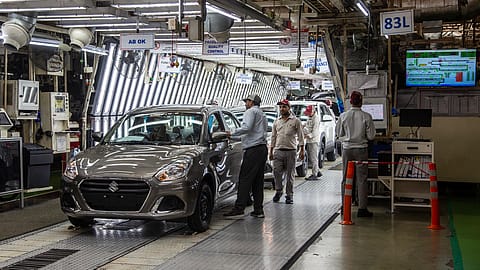Q1 car sales in India slower than expected: Suzuki
Suzuki says it is currently adjusting production to reduce market stock in India.

The Indian market is usually a bit slower in the first quarter than the rest of the year, but this year has been slower than expected, especially due to the election and adverse weather, including heavy rain and heat waves, Suzuki Motor Corporation’s management told analysts in an earnings call.
Suzuki says it is making adjustments as inventories have increased. “We are currently adjusting production to reduce market stock and are closely monitoring demand trends. India will be in a critical period for the upcoming festive season, so we will closely monitor demand trends,” the management of Suzuki says.
Suzuki Motor Corporation holds 58.19% stake in Maruti Suzuki, India's largest carmaker.
In India, the rate of progress in the first quarter is between 20% and 22%, and it will increase to 25% to 30% from the second quarter to the third quarter during the peak demand period of the festive season, says Suzuki.
“This year, the festive season starts in late August, a little earlier than the previous year, and the higher the demand, the volume for the whole period becomes bigger,” it says.
The full-year growth forecast of the Society of Indian Automobile Manufacturers (SIAM) for this year remains at around 2-3% higher than the previous year. “In particular, in the second half of the fiscal year, we will place efforts to increase the number of units to the same level as initially planned,” says Suzuki.
Suzuki says it will officially unveil its battery electric vehicle (BEV) eVX at Auto Expo in India in January next year. “We hope to launch it in early 2025. We will give priority to Europe first, and then expand to India and Japan,” the Suzuki management says.
Recommended Stories
Sales of motorcycles in the Indian market have been very strong, says Suzuki. Production reached a 1 million unit level last fiscal year and has been growing steadily since then, it says.
Wholesale sales of passenger vehicles declined by 2.5% to 3,41,510 units in July 2024, compared to 3,50,355 units in July 2023, according to the latest data released by SIAM. This decline occurred as original equipment manufacturers (OEMs) adjusted their shipments to dealers due to high unsold inventory at retail outlets.
“Though three-wheeler and two-wheeler segments are performing well, there has been some de- growth of passenger vehicles and commercial vehicles in July 2024, compared to July 2023. The above average rainfall coupled with the upcoming festive season is likely to again propel growth in the short term,” said Vinod Aggarwal, president at SIAM.
According to the Federation of Automobile Dealers Associations (FADA), passenger vehicle inventory levels have soared to a historic high of 67-72 days, amounting to ₹73,000 crore in unsold stock.
(INR CR)